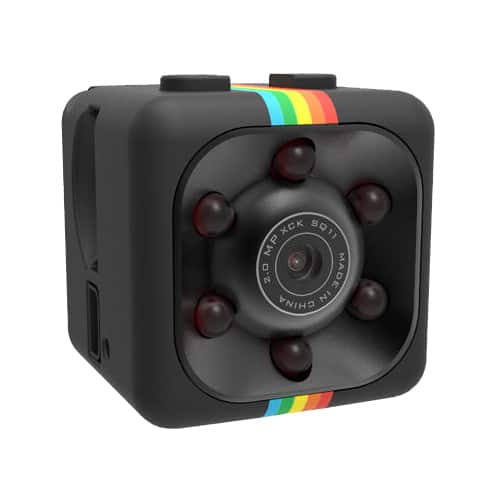What are the pros and cons of using hidden cameras? Well, they offer a discreet method for monitoring security. Which is ideal for ensuring caregiver accountability and enhancing home safety. They are often hidden in everyday items, providing essential footage without being noticeable. However, they can invade privacy and create ethical dilemmas about consent. Potentially fostering mistrust and discomfort. Especially among family members or employees. By understanding both the legal implications and emotional impacts, you’ll be better equipped to decide how to integrate these devices into your security setup responsibly.
Key Takeaways
- Hidden cameras enhance home security and provide evidence in misconduct cases.
- They offer discreet monitoring, reducing obvious signs of surveillance.
- Privacy concerns arise, as hidden cameras can invade personal spaces.
- Legal issues include the need for consent, particularly for audio recording.
- Emotional impacts include mistrust and relationship strain due to perceived secrecy.
Understanding Hidden Cameras: Definitions and Types

Although hidden cameras are often associated with espionage, they’re increasingly used in everyday settings for security and peace of mind. You might find these surveillance cameras disguised as ordinary household items—think smoke detectors or stuffed animals.
They come in several forms: wireless, mini cameras, and more traditional models, each designed to blend seamlessly into your environment. Whether you’re monitoring a caregiver or ensuring your pets are safe while you’re away, these spy cameras can be essential.
However, they’re not all created equal. Basic models start around $100, but for high-resolution and additional features, you’re looking at over $500.
Pictured above is the Mini Hidden Spy Camera With DVR currently on sale for under $30 at Nittany Self Defense.
And watch this entertaining and informative video about hidden spy cameras!
The Advantages of Implementing Hidden Cameras in Security Systems
When you install hidden cameras as part of your security system, you’re stepping up your home’s safety game without making it obvious. These discreet surveillance tools capture crucial footage in sensitive spots, deterring misconduct or theft subtly.
You’ll find peace of mind, especially as a parent, knowing you can monitor caregiver interactions with your kids remotely. Thanks to advanced features like motion detection and mobile alerts, you’re always in the loop.
Whether it’s preventing unauthorized activities or ensuring child safety, hidden spy cameras blend seamlessly into your daily environment, enhancing security without the intrusive presence.
This growing reliance on hidden cameras in places like daycare centers underscores their effectiveness in building trust and ensuring a secure atmosphere.
The Drawbacks of Hidden Cameras: Privacy and Ethical Concerns
As you consider installing hidden cameras, it’s important to recognize the potential for privacy invasion that can make people uneasy in their personal spaces.
You must also navigate the complex legal landscape, as several states have strict laws against recording without explicit consent from all parties involved.
In addition, using hidden cameras can severely damage trust, possibly leading to ethical dilemmas and a decrease in job performance among those monitored.
Legal Compliance Risks
Maneuvering the maze of legal compliance is essential if you’re considering the use of hidden cameras. In states like California, Florida, and Massachusetts, recording conversations without everyone’s consent isn’t just frowned upon; it’s illegal. This introduces significant legal compliance risks.
Violating these laws can lead to hefty fines or even criminal charges. You must be aware that privacy rights are at stake when you use hidden cameras. If you record someone in a private setting without their knowledge, you’re risking not only legal repercussions but also potential civil lawsuits.
This tangled landscape of surveillance regulation requires careful navigation. Always guarantee you understand and adhere to local laws before setting up any hidden cameras.
Ethical Surveillance Implications
While hidden cameras might seem like a reliable security measure, they bring with them a host of privacy and ethical concerns that can’t be ignored.
You’re dealing with tools that can easily infringe on personal privacy, often capturing footage without consent. This not only risks legal issues but also challenges ethical norms.
Think about the impact on trust when employees or caregivers find out they’ve been monitored secretly. It can create a toxic environment filled with resentment.
Furthermore, such surveillance fosters a culture of secrecy, potentially leading to rebellion, especially among monitored children and workers.
Always remember, maintaining transparency is essential in avoiding conflicts and respecting personal agency while maneuvering the complex terrain of ethical surveillance practices.
Privacy Invasion Issues
Exploring further the implications of hidden cameras, we must confront the significant privacy invasions they often entail. When you’re unaware, these devices can capture your every move, leading to serious ethical dilemmas.
In many states, recording someone without consent isn’t just frowned upon; it’s illegal. This highlights the complex legal landscape surrounding hidden cameras.
Additionally, their presence can sow seeds of mistrust among caregivers perceived as surveillance tactics rather than safety measures. This mistrust could erode the very foundation of personal relationships, making everyday interactions strained.
Legal Aspects of Using Hidden Cameras in Various Locations
Why should you care about the legal aspects of using hidden cameras? Understanding the legalities guarantees you don’t infringe on privacy rights and face severe consequences. Here’s a quick guide:
| Location | Legality of Hidden Cameras | Audio Recording Laws |
|---|---|---|
| Private Homes | Generally legal | Consent required |
| Workplaces | Restrictions apply | Consent required |
| Public Spaces | Federal law permits | State restrictions |
| Daycare Centers | Legal with caveats | Follow state laws |
In states like California, Florida, and Massachusetts, recording conversations without consent is illegal. Always research local laws before setting up hidden cameras, as non-compliance can lead to fines or even criminal charges. Stay informed to use technology responsibly and legally.
Emotional and Psychological Impact of Hidden Cameras on Individuals
You mightn’t realize it, but the psychological toll of hidden cameras can be significant.
When you’re constantly under surveillance, you may feel a deep sense of mistrust and anxiety, which can strain relationships and deteriorate your mental health.
It’s essential to weigh these privacy invasion consequences against the intended safety benefits.
Trust Erosion Effects
While hidden cameras might seem like a prudent safety measure, they often corrode trust deeply within family relationships. You might think you’re just being cautious, but the emotional dynamics in your home could suffer. Trust erosion isn’t just a buzzword; it’s a significant fallout of unconsented surveillance.
| Impact Area | Short-term Effect | Long-term Consequence |
|---|---|---|
| Caregiver Trust | Feeling deceived | Long-term resentment |
| Child Security | Immediate rebellion | Lasting distrust |
| Family Communication | Secrecy increases | Breakdown in dialogue |
| Personal Anxiety | Increased discomfort | Chronic insecurity |
| Relationship Health | Suspicion grows | Foundation undermined |
Understanding these effects helps you weigh the true cost of hidden cameras against their intended safety benefits.
Surveillance Stress Factors
When hidden cameras infiltrate your personal space, the emotional and psychological toll can be significant. You might feel a constant buzz of anxiety, knowing that every move could be watched.
This surveillance camera presence often fosters mistrust and resentment, especially if you’re a caregiver, affecting your relationships profoundly. Imagine feeling like you’re always under a microscope, leading not only to discomfort but also altering your natural behavior.
Such an oppressive atmosphere can also provoke secrecy and rebellion, particularly in children, who may then struggle with emotional distress.
If you’re part of a family being monitored, the strain on your privacy can ignite conflicts, disrupting the harmony at home.
Privacy Invasion Consequences
Exploring further the emotional and psychological impact of hidden cameras, it’s clear that these devices can deeply affect personal relationships and individual well-being. If you discover a hidden camera installed by a partner, you’re likely to feel a profound breach of trust, potentially unraveling the fabric of your relationship.
Children monitored by hidden cameras may grow resentful, feeling their personal space has been violated, which can erode trust towards their parents. Here’s a quick overview:
| Target | Emotional Impact | Trust Impact |
|---|---|---|
| Adults | Unease, relationship strain | Mistrust, secrecy |
| Children | Resentment, discomfort | Distrust, rebellion |
| General | Defensive, withdrawn | Lack of openness |
Privacy invasion through hidden cameras can fundamentally alter how you interact and connect with others, leading to a guarded, less open lifestyle.
Case Studies: Effective Use of Hidden Cameras in Real-World Scenarios
If you’ve ever wondered about the real-world effectiveness of hidden cameras, numerous case studies highlight their essential role in enhancing safety and accountability.
For instance, in New York, hidden cameras installed by parents at a daycare uncovered inappropriate behavior by a staff member. This not only led to legal action but also spurred significant oversight changes within the facility.
Similarly, in a California nursing home, hidden cameras captured staff neglect, resulting in substantial policy changes and enhanced training for caregivers.
These examples show how hidden cameras can serve as imperative tools in ensuring proper care and fostering trust, particularly when you’re entrusting your loved ones to others.
Comparing Hidden Cameras With Visible and Fake Security Cameras
As we’ve seen, hidden cameras can play a pivotal role in safeguarding vulnerable populations and securing private properties. Unlike visible cameras, which deter potential intruders but may raise privacy concerns, hidden cameras offer discreet surveillance. This means you can monitor sensitive areas without alerting anyone to the camera’s presence.
However, they don’t have the deterrent effect of visible cameras, which are easy to spot and can discourage criminal activity just by being visible.
Fake security cameras, on the other hand, are much cheaper and require minimal upkeep, but they offer no real surveillance capabilities. They can’t record footage or provide evidence if something happens.
While visible cameras might impact the look of your property, fake cameras provide no actual security benefits.
Best Practices for Installing and Managing Hidden Cameras
While you’re setting up hidden cameras, it’s important to place them strategically so they capture everything without being spotted.
Make sure they’re well-hidden yet offer a clear view of essential areas, maximizing your home security effectiveness.
Remember, adhering to local laws is significant, especially concerning recording conversations without consent, which is illegal in many states, including California and Florida.
Regularly inspect and maintain your hidden cameras to avoid surveillance gaps caused by technical failures.
Opt for high-quality security cameras, featuring clear resolution and night vision, to guarantee reliable monitoring under all conditions.
Finally, use encrypted cloud services for storing recorded footage securely, protecting it from unauthorized access and safeguarding your privacy.
Frequently Asked Questions
What Are the Disadvantages of Hidden Cameras?
Hidden cameras often lead to an invasion of privacy, stirring ethical concerns and legal implications. You might face resentment and a lack of trust from caregivers, potentially damaging important relationships and creating legal issues.
How Do You Detect if a Hidden Camera Is Watching You?
Nearly 11% of people have found hidden cameras in rentals. To detect them, scan for unusual Wi-Fi signals, use detection apps, and look for tiny reflections. Always consider privacy invasion and legal implications.
What Are the Benefits of Hidden Cameras?
You’ll find hidden cameras boost safety, but you must weigh privacy concerns, legal implications, and ethical considerations. They provide peace of mind, yet guarantee you’re steering the balance between security and privacy rights.
What Are the Pros and Cons of Surveillance Cameras?
You might find it interesting that 70% of large retailers use surveillance cameras. They boost security but raise privacy concerns, ethical implications, and require maneuvering legal regulations to guarantee they’re used responsibly.
Conclusion
As you weigh the cloak-and-dagger allure of hidden cameras against ethical quandaries, remember Big Brother isn’t just a dystopian fiction—it’s a cautionary tale. These devices can fortify your security but tread carefully to respect privacy and legal boundaries. Always consider the emotional toll on those surveilled. Choose wisely, use responsibly, and let your security tools be as invisible in their presence as they are potent in their protection. Knowledge and discretion are your best allies.



